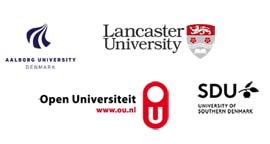

Triggering dialogic activities across networks
Christine Sinclair, Hamish Macleod, University of Edinburgh,
Our study originates in exploratory interventions aimed at engaging students with relevant practices to support learning both in and about digital environments. Our students come from a wide range of professional contexts all over the world. Most are involved in teaching or supporting teaching. What they learn on our programme is carried into their practice - and vice versa. Their introductory course explores a range of environments along with critical literature, with a strong theoretical emphasis. The authors both have an interest in dialogic approaches to education, and we share findings on activities designed and tutored by each of us. A webquest and an online text augmentation exercise were both found to promote student creativity, dialogue and learning. While we had respectable pedagogical reasons for these activities, our subsequent reflections and conversations about them suggested that they were worthy of further theoretical analysis. Our students demonstrated considerable use of existing networks while at the same time apparently generating new networks that would sustain them throughout a programme of study and beyond. Drawing on Wegerif's (2013) notion of dialogic and its Bakhtinian influences, we attempt to distinguish and name features of networks likely to trigger dialogic exchanges that foster learning. We have isolated examples from each practice of particularly ‘interanimating' sections of dialogue and created a thick description of them, including their antecedents and consequences. Our examples illustrate that both practices raised questions about purpose, offered opportunities for showcasing knowledge and connections, led to sharing and making practices visible, and were taken forward to new contexts. The findings are not all positive; we have also identified concerns about exclusion or inadequacy from those who feel unable to participate fully, but even then there is potential to turn around difficult situations. This study might have practical application for learning designers but should also be of theoretical interest for research into newer forms of academic literacy.
Keywords
webquest, augmentation, genre, Bakhtin, interanimation, nodes, flows of knowledge
Joint Organising Institutions
| Past Conference Proceedings |Call for Book Proposals| Contact |